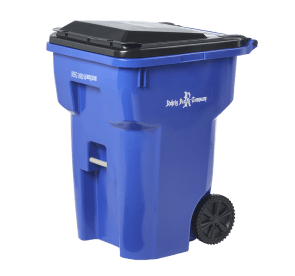
Los Angeles, CA (June 24, 2021) National waste and recycling solutions company Rehrig Pacific recently won a sole source agreement with the City of Baltimore, MD, in collaboration with The Recycling Partnership (TRP), American Beverage Association and Dow to produce 205,000 residential recycling carts. The carts will be produced using recycled post-consumer curbside content, which includes difficult-to-recycle consumer goods such as laundry baskets, milk jugs, and toys.
“It’s exciting when our expertise and a city’s need align so perfectly,” said Marc Scott, Vice President of Environmental at Rehrig Pacific. “Sustainability is truly at the core of this company, and our ability to manufacture these carts from post-consumer content was an ideal solution to help the City of Baltimore continue as a leader in sustainability and innovation. Making a difference in communities while bringing sustainable manufacturing solutions to our partners is what brings real value in our line of work.”
Rob Taylor, Director of Grants and Community Development agreed. “The Recycling Partnership is so pleased to work together on this unique partnership with the American Beverage Association, Dow, Rehrig Pacific, and The City of Baltimore to make this project a reality. Thanks to our collaboration, and the City of Baltimore choosing Rehrig Pacific as their cart manufacturer, the residents of Baltimore will soon have one more simple way to help protect our planet by wasting less and recycling more. We are particularly excited to be working with Rehrig Pacific on The Recycling Partnership’s first big cart project that meets post-consumer recycled content requirements for our grant funded carts.”
The Recycling Partnership estimates the new recycling containers have the potential to generate an estimated 40 million new pounds of recyclables per year – an 80% increase of recyclables per household in Baltimore. The city-wide distribution of new recycling carts is also expected to greatly increase the diversion rate for waste that would have otherwise ended up in the local waste incinerator or landfill.
Rehrig Pacific’s work in Baltimore is only the latest in a long series of sustainability innovations from the firm. Rehrig Pacific has worked with leading beverage companies to develop recycling solutions for the wrappers and caps on plastic bottles, which are traditionally discarded, even in the recycling process. And, building on opportunities like Baltimore, Rehrig Pacific engineers are currently on the cutting edge of developing solutions for bulky rigid plastics, like laundry baskets and large toys, which have historically been neglected in status quo recycling practices. Rehrig Pacific routinely works directly with customers to develop customized closed-loop and circular plastic economy solutions tailor-made to achieve bold sustainability goals.
Founded in 1913, Rehrig Pacific’s products and solutions create value for their customers’ products and ideas as they move throughout the global supply chain. The company’s proven success comes from focusing on the needs of its customers’ customer, integrating technology to eliminate waste, enhancing the consumer experience, continually delivering solutions that are simple and easy to implement, and providing ideas that are driven by a relentless commitment to sustainability. Learn more at www.RehrigPacific.com.
The Recycling Partnership is a national nonprofit organization that leverages corporate partner funding to transform recycling for good in states, cities, and communities nationwide. As the leading organization in the country that engages the full recycling supply chain from the corporations that manufacture products and packaging to local governments charged with recycling to industry end markets, haulers, material recovery facilities, and converters, The Recycling Partnership positively impacts recycling at every step in the process. Since 2014, the nonprofit change agent diverted 230 million pounds of new recyclables from landfills, saved 465 million gallons of water, avoided more than 250,000 metric tons of greenhouse gases, and drove significant reductions in targeted contamination rates. Learn more at recyclingpartnership.org.
